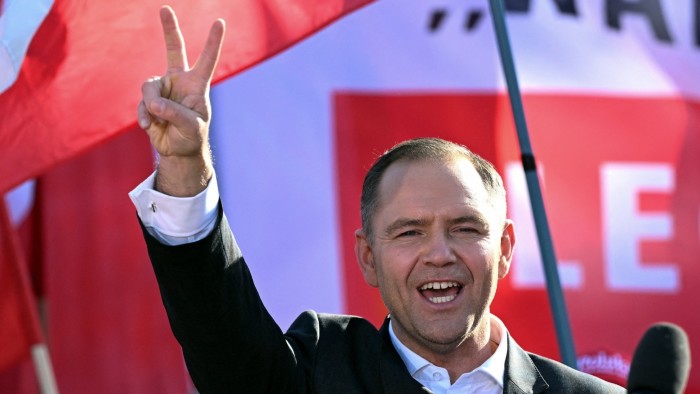Unlock the Editor’s Digest for free
Roula Khalaf, Editor of the FT, selects her favourite stories in this weekly newsletter.
Poles went to bed on Sunday thinking a centre-right candidate had won their presidential election. They woke to find a nationalist populist had squeaked home instead. Karol Nawrocki’s 51-49 per cent victory was wafer-thin, but a bitter reversal. It comes only 18 months after the return of the centrist Donald Tusk as prime minister seemed to open a path to restore democracy and rule of law in Poland after eight years of state capture by the conservative Law and Justice (PiS) party — which nominated Nawrocki. After right-wing losses in Canada, Australia and Romania, the result also marks a win in the heart of Europe for a candidate endorsed by Donald Trump’s Maga movement.
Tusk’s coalition has so far been stymied by a confrontational, PiS-backed president, Andrzej Duda, who has blocked or delayed its reform efforts by using his powers to veto legislation or refer it to Poland’s constitutional court (packed with PiS appointees). The premier had staked his near-term political future on hopes that a supportive president — in the shape of Rafał Trzaskowski from his Civic Platform party — would soon unshackle him. Instead Nawrocki, a one-time football hooligan who has never held elected office, threatens to be even more hostile.
The Tusk camp must bear some blame. The prime minister’s instinct was understandably to move fast to restore checks and balances and judicial independence, not least to release EU funds blocked by Brussels over rule of law concerns. But his government immediately butted up against Duda, occasionally prompting it to resort to methods of borderline legality.
Tusk arguably did too little to heal divisions in one of the most polarised democracies outside the US. What became a highly personal struggle between the premier and Jarosław Kaczyński, the PiS co-founder and Tusk’s longtime nemesis, left a growing number of especially young voters feeling that neither party truly had their interests at heart. Many of those plumped for hard-right and hard-left candidates in the first round of the presidential election; Nawrocki relied on a good proportion switching to him to help him over the line in round two.
Tusk has called a June 11 confidence vote which — since his coalition partners are unlikely to want to risk losing power — he ought to win, though such moves are always risky. But if Nawrocki uses his presidential powers to veto a budget he might still be able to force an early election.
To strengthen its chances of holding on in office until the next parliamentary election in 2027, and averting a PiS victory, it will require a change of approach. One route might be to adopt a more consensual programme, politically harder for the president to veto, that seeks directly to address voters’ main preoccupations, similar to those in many western countries: living costs and the burdens of immigration — though in Poland’s case mostly not from north Africa or the Middle East but from its war-torn neighbour, Ukraine.
For Poland’s European partners, one consolation is that Nawrocki and PiS do not share the pro-Russian leanings of, say, Hungary’s Viktor Orbán. But the Eurosceptic Nawrocki is preoccupied with historical grievances between Poland and Germany, and opposes Kyiv’s Nato membership and EU efforts to build up its own defences independent of the US. His Poland may be a less solid partner in the “coalition of the willing” that the UK, France and Germany are assembling to bolster Ukrainian security. The fact, meanwhile, that right-wing populism can become so entrenched in a country that has been a standout economic success among the ex-communist states that joined the EU after 2004 is yet more evidence of how far mainstream parties are from learning how to counter it.
